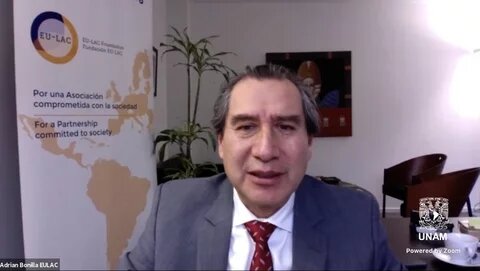This day the Executive Director of the EU-LAC International Foundation, Dr Adrián Bonilla was invited to give a Master Lecture under the theme "The reinvention of Europe: current issues and future scenarios" in the framework of the XVII Interuniversity Meeting of European Studies organized by the Center for European Studies (CEE) of the Faculty of Political and Social Sciences of the UNAM, Mexico.
Watch Dr Adrian Bonilla's Master Lecture on Youtube (in Spanish)!
His speech addressed the issues of the composition of the European Union (EU) in historical terms and its current role as an international actor. He also focused on bi-regional relations between the European Union and Latin America and the Caribbean (LAC), situating them in the current transformation of the global system towards a polarization of the international order.
In addition to understanding Europe as a community of shared values, an economic community, a geographic entity, and a political association, Dr Adrián Bonilla describes the EU as "a system of integration" with common rules and interests. He contrasts the concept of the European Union to the idea of a nation-state. It is, according to Dr Bonilla, multiple states that agree on common rules on certain issues while maintaining the autonomy of each member country.
In the case of the partnership with LAC, there are numerous agreements between the two regions at the bi-regional, regional and bilateral levels. Dr Adrián Bonilla explains that, despite the union of Latin American and Caribbean countries in the Community of Latin American and Caribbean States (CELAC), "the region exists in a context of diversities, which also marks the different forms of partnership with Europe".
However, according to Dr Bonilla, there are several issues of mutual interest that link the two regions. In this logic, the agenda for the future between LAC and the EU includes several pillars of propositional strength to keep multilateralism alive. It also highlights the fabric of intense relations in cultural terms and the hundreds of bilateral agreements with various European states, especially in academic relations.
"The challenge of the reinvention of LAC and the EU is, in the face of the new international order being shaped, to join forces to have a voice and act against a new polarization of the global world."
